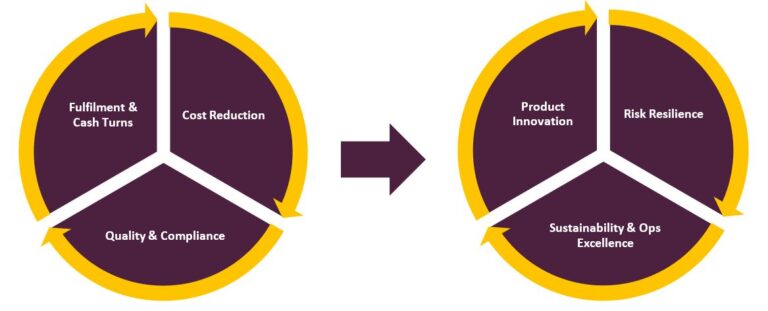
During a recent dinner meeting with the SVP Supply Chain of a multibillion-dollar industrial company, the question was posed, “How has 2022 been so far, and how are you positioned to finish the year?” After a long pause, he responded, “there was never a dull moment.” He further explained that the events, which in the past used to be characterized as “Black Swan,” are slowly becoming the norm.
From boardrooms to the hallways of the U.S. Capitol and newspapers to blogs on social media, the supply chain has become the talk of the town. Management consultants have been pondering and writing about it, technology companies have been launching budget-conscious solutions, triage teams are being established to backstop risks, and governments are directly engaging worldwide to secure their vital supply chains. However, the existing solutions have been limited despite the focus and attention. Our field is populated by noise and clutter, leaving an oversaturation of approaches that consistently come short of what is needed. There has been an “analysis paralysis” effect, and actions are not yielding the desired results.
Today, we find ourselves highly vulnerable to geopolitical and economic instability and uncertainty. The industry has been heavily impacted by macroeconomic issues of inflation and recession amidst global conflict and geopolitical instability. This takes a significant toll on supply chain organizations. In fact, during the last two decades, these organizations have worked in a world driven by volatility, uncertainty, chaos, and ambiguity (VUCA). As economic cycles continue to shrink, this will be the new norm.
In addition, the mass exodus of talent in industries like aerospace and defense (A&D) has exacerbated the challenges. Where identifying key risk factors like commodity pricing, seasonal logistics constraints, and supplier performance might have once been enough to maintain a strategic hold of the supply chain, senior leaders everywhere need help to determine why these practices no longer cut it. Now more than ever, we need innovative ways of thinking and a talent pool with diverse ideas that can provide fresh perspectives to mitigate and solve the current threats.
Stepping back and looking from a high level, we can identify that these fundamental supply chain problems stem from constraints and inefficiencies that have existed for decades. While these are not new issues, the increased frequency of natural disasters and geopolitical instability, along with the fundamental supply chain constraints and inefficiencies that have previously been ignored, are now more visible.
The key post-pandemic takeaway in supply chain management for organizations everywhere is that their strategy needs to prioritize being flexible, nimble, and resilient. This requires fresh thinking and a new breed of professionals across supply chain organizations who can think cross-vertically, finding creative ways to identify critical issues in industries that might not traditionally be factored into their organization’s strategy.
There are three critical areas businesses need to revisit:
Redefining Supply Chain Performance Measurements
Today’s supply chain challenges require organizations to think beyond safety, cost, inventory, quality, and delivery. As a first step, supply chain organizations must evolve their balanced scorecards to align with the new reality.

Supply Chain Processes and Operational Excellence:
Organizational Vitality:
The 2021 Gartner Supply Chain Risk and Resilience Survey predict that “by 2025, supply chain risk management will be a key success driver for more than 50% of organizations.
”Forward-looking companies are driving the above essential elements with urgency and are able to turn their supply chain resiliency and flexibility into a competitive advantage. Companies leading the transformation are relooking at their organizational capability to drive change and strategically lean on partners who bring depth and breadth to augment their transformation.
Quest Global is a “generational partner” to expand and accelerate supply chain transformations across those three essential areas highlighted above. Our approach brings solutions that evolve and transcend across business and product cycles, and we align with our customer’s product lifecycles for decades to come. As companies scramble to rapidly transform their internal organization to adapt to the demands of the VUCA world, we enter to drive the urgency and accelerate change management through our nimble, flexible solutions.
As a partner in supply chain organization, Quest Global has access to a constant flow of rich knowledge across Aerospace and Defense, Energy, Rail, and Medical Devices, which allows us to identify anomalous factors disrupting our clients’ supply network. We solve the toughest supply chain problems by leveraging our deep understanding of our customers’ products and technical experience, bringing in the right supply chain skills and capability, and leveraging pervasive digital technology solutions. This unique convergence of capabilities helps us ideate with our customers, identify areas where we can become “catalysts” for driving change, and deliver outcomes through operational rigor.
Companies globally continue to face multi-dimensional supply chain challenges and struggles despite the plethora of efforts, strategies, and solutions thrown at them. Now is the time for actionable strategies and a robust implementation plan to drive resilience, flexibility, and excellence in their supply chains. In many cases, this feels like an impenetrable barrier to growth in our VUCA reality. Quest Global continues to be the right partner who can help accelerate and augment supply chain transformation during these challenging times. As generational partners, our teams are ready to take on and address the most complex supply chain problems, not just the ones confronting us today but also the ones lurking on the horizon.